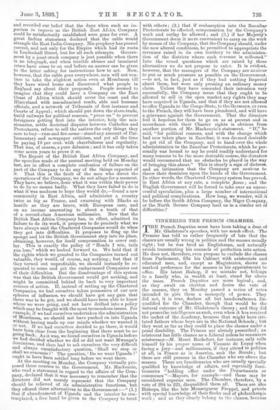THE BRITISH EAST AFRICA COMPANY.
WHEN the plan of acquiring and administering a new Empire in Africa by means of Chartered Com- panies was first mooted, we expressed our dissatisfaction, and recorded our belief that the days when such an inz- periurn in imperio as the British East Africa Company could be satisfactorily established were gone for ever. A great Indian statesman declared that the cable would strangle the East India Company. His prophecy has proved correct, and not only for the Empire which bad its roots in Leadenhall Street, but for all such attempts. Govern- ment by a joint-stock company is just possible when there is no telegraph, and when terrible abuses and imminent crises have come to an end before an answer can be given to the letter asking for instructions how to act. Now, however, that the cable goes everywhere, men will not ven- ture to take the slightest action even at Mombassa till they have wired home and discovered what people in England say about their proposals. People seemed to imagine that they could have a Company on the East Coast of Africa which should cover the coast and the Hinterland with macadamised roads, able and humane officials, and a network of Tribunals of first instance and Courts of Appeal; which should put down the slave-trade, build railways for political reasons, "press on" to prevent foreigners getting first into the interior, help the mis- sionaries, settle doctrinal disputes between Catholics and Protestants, refuse to sell the natives the only things they care to buy—rum and fire-arms—stand any amount of Par- liamentary and newspaper criticism, and, yet all the time be paying 10 per cent. with cheerfulness and regularity. That was, of course, a pure delusion ; and it has only taken some seven years to prove it so. The Report of the British East Africa Company, and the speeches made at the annual meeting held on Monday last, are in effect a complete confession of failure on the part of the Company to do any of the things expected of it. That this is the fault of the men who direct the operations of the Company, we do not allege for a moment. They have, we believe, done what it was within their power to do by no means badly. What they have failed to do is what it was madness to hope they would do,—found a new community in East Africa, and administer a country twice as big as France, and swarming with Blacks as hostile as they are brave, with European care, and on an income amounting to about a tenth of that of a second-class American millionaire. Now that the British East Africa Company has, in effect, admitted its failure to do its work, it proposes to do precisely what we have always said the Chartered Companies would do when they got into difficulties. It proposes to fling up the sponge and let the British Government step into its place, obtaining, however, for itself compensation to cover out- lay. This is exactly the policy of "Heads I win, tails you lose," which we looked forward to. We held that if the rights which we granted to the Companies turned out valuable, they would, of course, say nothing ; but that if they turned out unprofitable, we should instantly be re- quested to come and get the embarrassed Companies out of their difficulties. But the disadvantage of this system was that the British Government would get nothing, and might be committed behind its back to very important courses of action. If, instead of setting up the Chartered Companies, we had ourselves taken possession of our new spheres of influence, we should have got any gain that there was to be got, and we should have been able to know Where we were going, and not have drifted into a policy which may be fraught with the most tremendous issues. For example, if we had ourselves undertaken the administration Of Mombassa, we should not have pushed on into Uganda Without having made up our minds whether we wanted it or not. If we had ourselves decided to go there, it would have been clear from the beginning that there must be no going back. As it ware, we found ourselves in Uganda before we had decided whether we did or did not want Mwanga's dominions, and then had to ask ourselves the very difficult and always unsatisfactory question, Shall we stop or shall we evacuate ?' The question,' Do we want Uganda P ought to have been settled long before we went there. At the meeting on Monday, the Company virtually pro- posed three courses to the Government. Mr. Mackenzie, who read a statement in regard to the affairs of the Com- pany, declared that it was necessary to remember that the directors did not merely represent that the Company should be relieved of its administrative functions, but they offered three alternatives to the Government :—" (1.) that if abandonment of Uganda and the interior be con- templated, a free hand be given to the Company to treat with others; (2.) that if reabsorption into the Zanzibar Protectorate be effected, compensation for the Company's work and outlay be allowed ; and (3.) if her Majesty's Government deem it more convenient to carry on the work by means of the Company, that the Company should, under the now altered conditions, be permitted to appropriate the revenues raised in its own territory to the administra- tion of the districts where such revenue is collected." Into the vexed questions which are raised by these alternatives we do not propose to enter. It is evident, however, that the managers of the Company are anxious to put as much pressure as possible on the Government, —to act, in fact, just as if they bad nothing Imperial about them, but were only pressing an ordinary money claim. Unless they have concealed their intention very successfully, the Company mean that they ought to be allowed to sell in the open market any rights they may have acquired in 'Uganda, and that if they are not allowed to offer Uganda to the Congo State, to the Germans, or even to the French, they will have been plundered, and will have a grievance against the Government. That the directors feel it hopeless for them to go on as at present and in accordance with their Charter rights is obvious from another portion of Mr. Mackenzie's statement. "If," he said, "for political reasons, and with the change which had now taken place in Zanzibar, it was deemed desirable to get rid of the Company, and to hand over the whole administration to the Zanzibar Protectorate, which he per- sonally was bound to say he could readily understand for many reasons to be the more desirable course, the directors would recommend that no obstacles be placed in the way of bringing this about." This is clearly a sign of distress, and an intimation that the Company are anxious to throw their dominion upon the hands of the Government. In other words, the Chartered Company system has proved, in East Africa at any rate, a complete fiasco,. and the English Government will be forced to take over an unsuc- cessful speculation, plus a large number of international and political complications. How long, we wonder, will-it be before the South Africa Company, the Niger Company, or the North Borneo Company land us in a similar set of difficulties ?







































 Previous page
Previous page